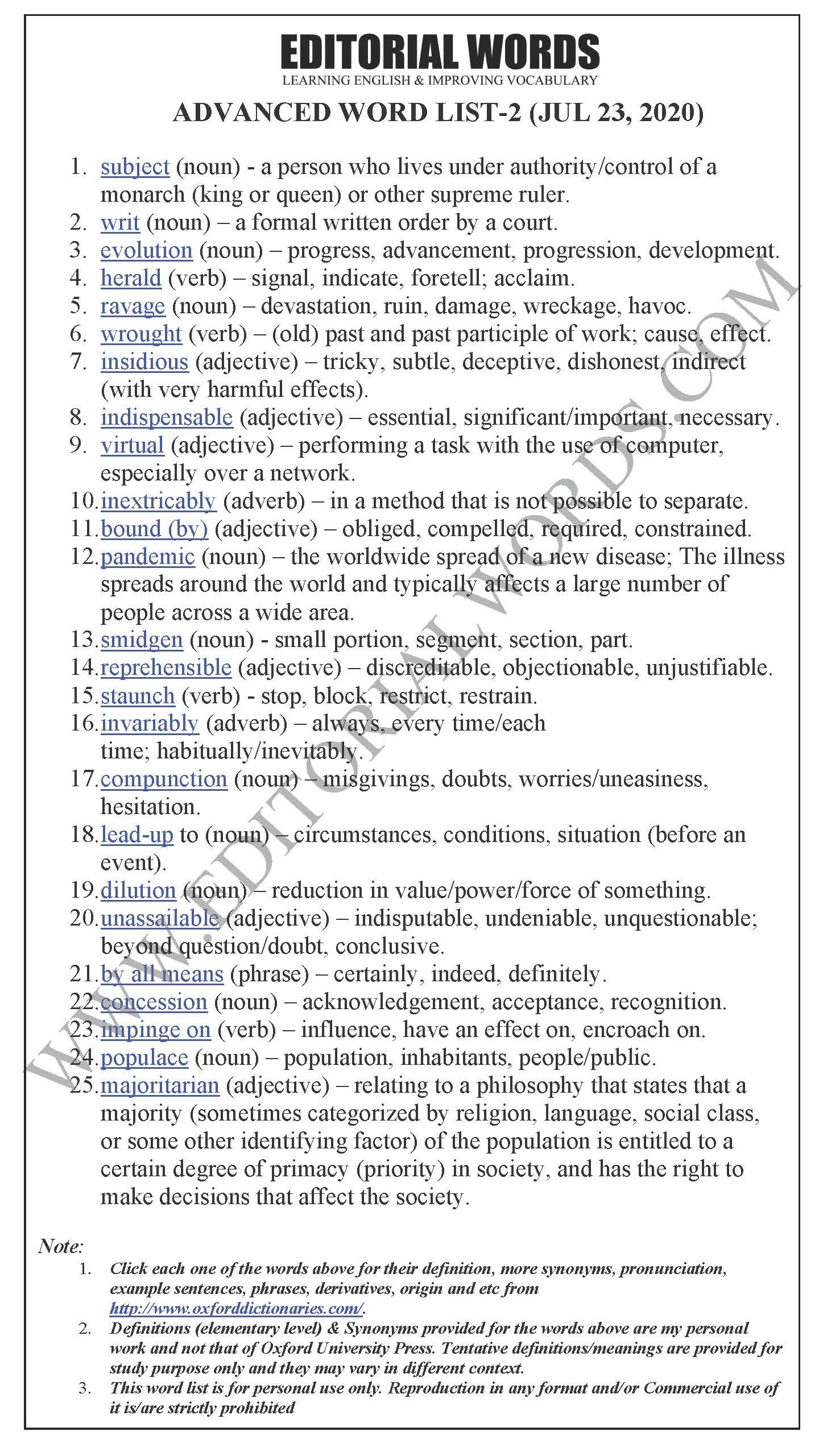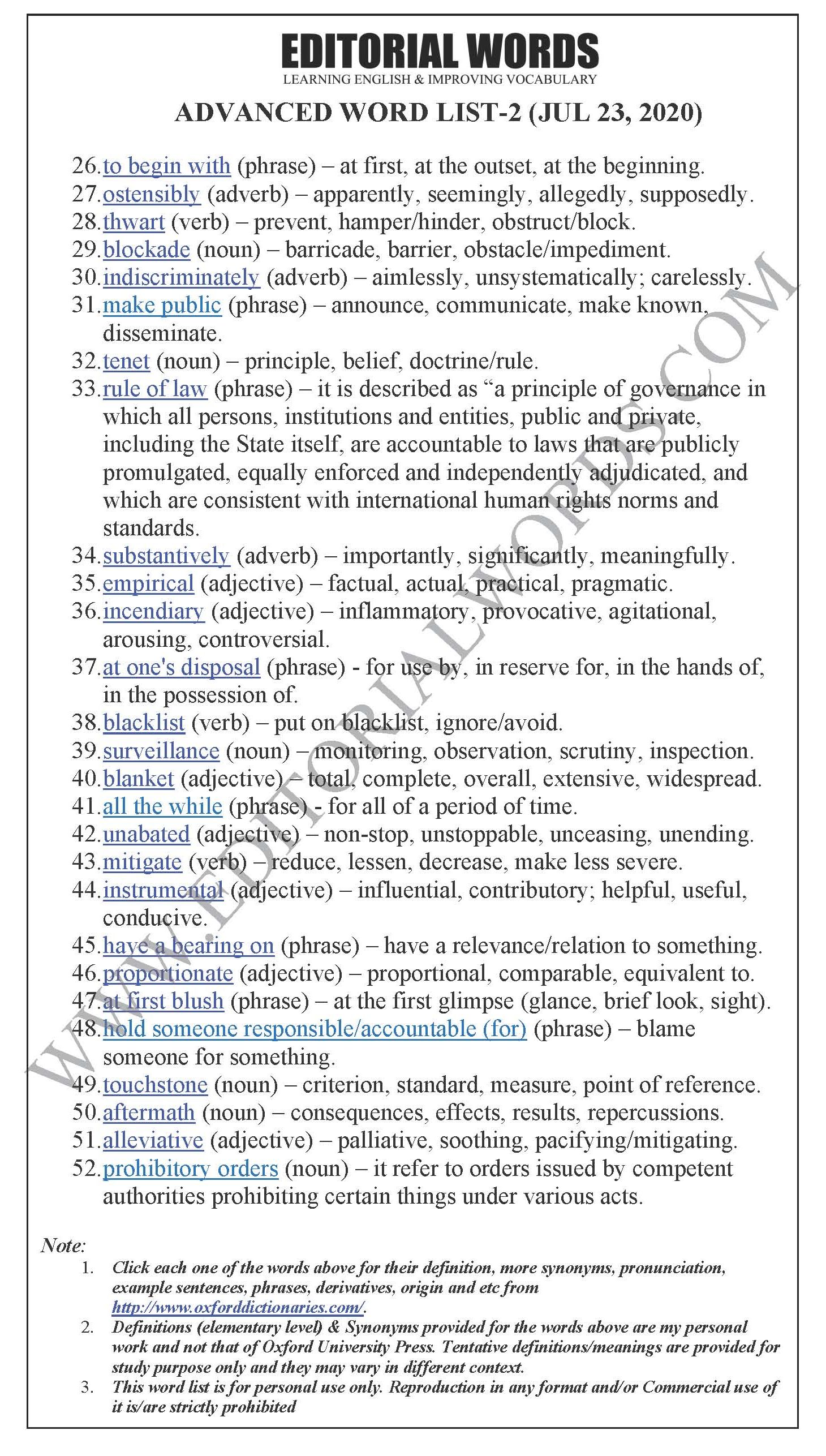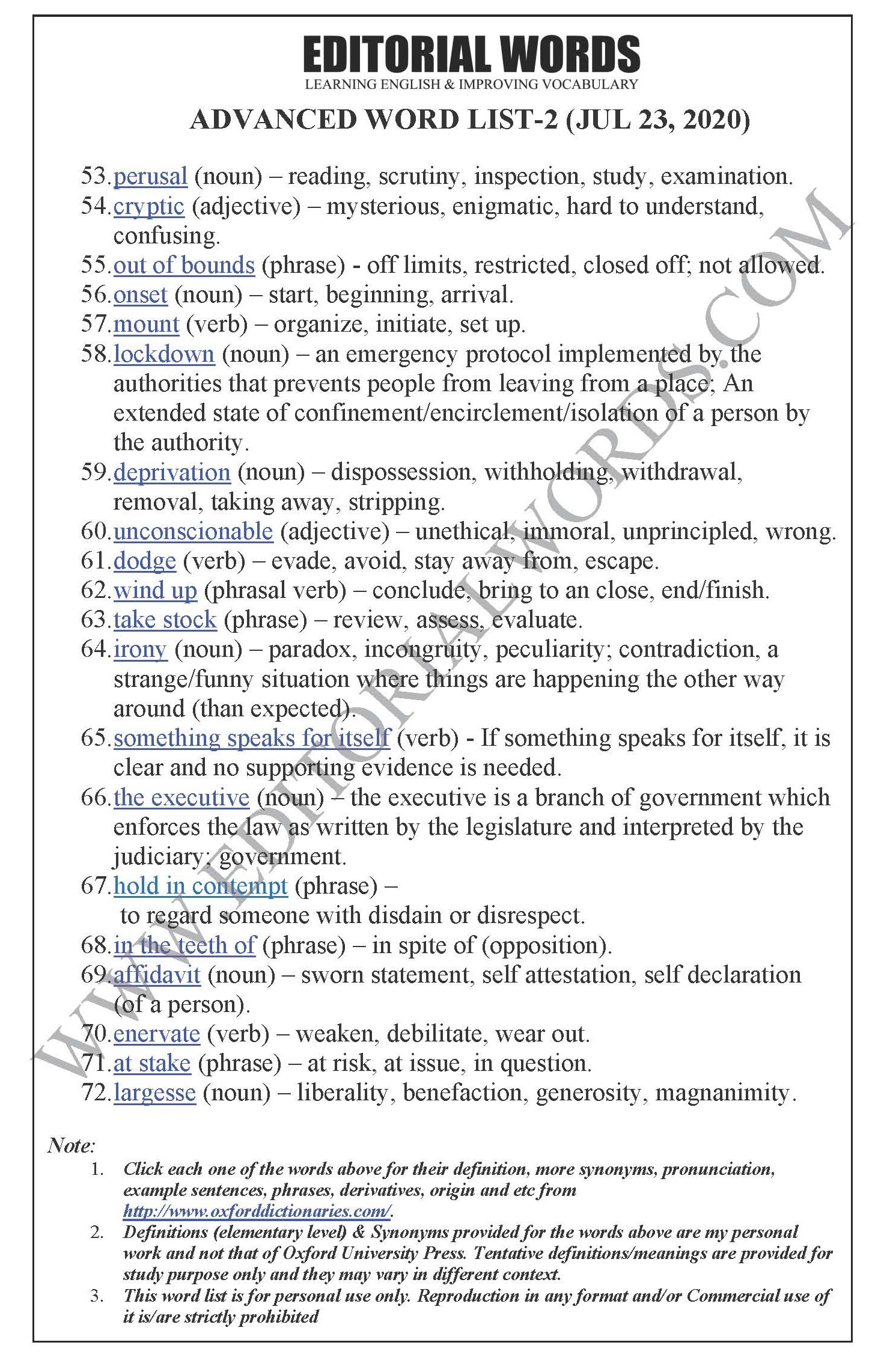The Hindu Opinion Article (Are people in J&K citizens or subjects?) – Jul 23, 2020
The Internet is often spoken about as a great equaliser. Its evolution was meant to herald a more equal society. For further reading, visit “The Hindu”. Below is today’s word list-2 for The Hindu Opinion Article (Are people in J&K citizens or subjects?) – Jul 23, 2020.
To read this article, click here.
This preview is provided here with permission.
Courtesy: The Hindu
Today’s Advanced Word List 2 For The Hindu Opinion Article (Are people in J&K citizens or subjects?) – Jul 23, 2020:
- subject (noun) – a person who lives under authority/control of a monarch (king or queen) or other supreme ruler.
- writ (noun) – a formal written order by a court.
- evolution (noun) – progress, advancement, progression, development.
- herald (verb) – signal, indicate, foretell; acclaim.
- ravage (noun) – devastation, ruin, damage, wreckage, havoc.
- wrought (verb) – (old) past and past participle of work; cause, effect.
- insidious (adjective) – tricky, subtle, deceptive, dishonest, indirect (with very harmful effects).
- indispensable (adjective) – essential, significant/important, necessary.
- virtual (adjective) – performing a task with the use of computer, especially over a network.
- inextricably (adverb) – in a method that is not possible to separate.
- bound (by) (adjective) – obliged, compelled, required, constrained.
- pandemic (noun) – the worldwide spread of a new disease; The illness spreads around the world and typically affects a large number of people across a wide area.
- smidgen (noun) – small portion, segment, section, part.
- reprehensible (adjective) – discreditable, objectionable, unjustifiable.
- staunch (verb) – stop, block, restrict, restrain.
- invariably (adverb) – always, every time/each time; habitually/inevitably.
- compunction (noun) – misgivings, doubts, worries/uneasiness, hesitation.
- lead-up to (noun) – circumstances, conditions, situation (before an event).
- dilution (noun) – reduction in value/power/force of something.
- unassailable (adjective) – indisputable, undeniable, unquestionable; beyond question/doubt, conclusive.
- by all means (phrase) – certainly, indeed, definitely.
- concession (noun) – acknowledgement, acceptance, recognition.
- impinge on (verb) – influence, have an effect on, encroach on.
- populace (noun) – population, inhabitants, people/public.
- majoritarian (adjective) – relating to a philosophy that states that a majority (sometimes categorized by religion, language, social class, or some other identifying factor) of the population is entitled to a certain degree of primacy (priority) in society, and has the right to make decisions that affect the society.
- to begin with (phrase) – at first, at the outset, at the beginning.
- ostensibly (adverb) – apparently, seemingly, allegedly, supposedly.
- thwart (verb) – prevent, hamper/hinder, obstruct/block.
- blockade (noun) – barricade, barrier, obstacle/impediment.
- indiscriminately (adverb) – aimlessly, unsystematically; carelessly.
- make public (phrase) – announce, communicate, make known, disseminate.
- tenet (noun) – principle, belief, doctrine/rule.
- rule of law (phrase) – it is described as “a principle of governance in which all persons, institutions and entities, public and private, including the State itself, are accountable to laws that are publicly promulgated, equally enforced and independently adjudicated, and which are consistent with international human rights norms and standards.
- substantively (adverb) – importantly, significantly, meaningfully.
- empirical (adjective) – factual, actual, practical, pragmatic.
- incendiary (adjective) – inflammatory, provocative, agitational, arousing, controversial.
- at one’s disposal (phrase) – for use by, in reserve for, in the hands of, in the possession of.
- blacklist (verb) – put on blacklist, ignore/avoid.
- surveillance (noun) – monitoring, observation, scrutiny, inspection.
- blanket (adjective) – total, complete, overall, extensive, widespread.
- all the while (phrase) – for all of a period of time.
- unabated (adjective) – non-stop, unstoppable, unceasing, unending.
- mitigate (verb) – reduce, lessen, decrease, make less severe.
- instrumental (adjective) – influential, contributory; helpful, useful, conducive.
- have a bearing on (phrase) – have a relevance/relation to something.
- proportionate (adjective) – proportional, comparable, equivalent to.
- at first blush (phrase) – at the first glimpse (glance, brief look, sight).
- hold someone responsible/accountable (for) (phrase) – blame someone for something.
- touchstone (noun) – criterion, standard, measure, point of reference.
- aftermath (noun) – consequences, effects, results, repercussions.
- alleviative (adjective) – palliative, soothing, pacifying/mitigating.
- prohibitory orders (noun) – it refer to orders issued by competent authorities prohibiting certain things under various acts.
- perusal (noun) – reading, scrutiny, inspection, study, examination.
- cryptic (adjective) – mysterious, enigmatic, hard to understand, confusing.
- out of bounds (phrase) – off limits, restricted, closed off; not allowed.
- onset (noun) – start, beginning, arrival.
- mount (verb) – organize, initiate, set up.
- lockdown (noun) – an emergency protocol implemented by the authorities that prevents people from leaving from a place; An extended state of confinement/encirclement/isolation of a person by the authority.
- deprivation (noun) – dispossession, withholding, withdrawal, removal, taking away, stripping.
- unconscionable (adjective) – unethical, immoral, unprincipled, wrong.
- dodge (verb) – evade, avoid, stay away from, escape.
- wind up (phrasal verb) – conclude, bring to an close, end/finish.
- take stock (phrase) – review, assess, evaluate.
- irony (noun) – paradox, incongruity, peculiarity; contradiction, a strange/funny situation where things are happening the other way around (than expected).
- something speaks for itself (verb) – If something speaks for itself, it is clear and no supporting evidence is needed.
- the executive (noun) – the executive is a branch of government which enforces the law as written by the legislature and interpreted by the judiciary; government.
- hold in contempt (phrase) – to regard someone with disdain or disrespect.
- in the teeth of (phrase) – in spite of (opposition).
- affidavit (noun) – sworn statement, self attestation, self declaration (of a person).
- enervate (verb) – weaken, debilitate, wear out.
- at stake (phrase) – at risk, at issue, in question.
- largesse (noun) – liberality, benefaction, generosity, magnanimity.
Today’s Advanced Word List 2 For The Hindu Opinion Article (Are people in J&K citizens or subjects?) – Jul 23, 2020:



Note:
-
Click each one of the words above for their definition, more synonyms, pronunciation, example sentences, phrases, derivatives, origin and etc from http://www.oxforddictionaries.com/.
-
Definitions (elementary level) & Synonyms provided for the words above are my personal work and not that of Oxford University Press. Tentative definitions/meanings are provided for study purpose only and they may vary in different context.
-
This word list is for personal use only. Reproduction in any format and/or Commercial use of it is/are strictly prohibited.
“Phrasal Verbs” We Learnt Last Week

Be the first to comment